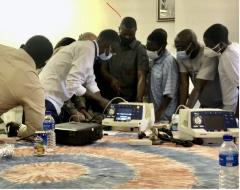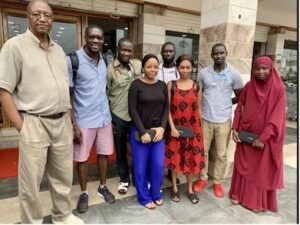
Four Certified Registered Nurse Anesthetists (CRNAs), all born and raised in The Gambia, are on a mission to make surgery safer in their home country through the education and training of nurse anesthetists there.
“There is a need for anesthesia services in The Gambia,” said Ebou Cham, MSN, CRNA, the interim chief CRNA at Harborview Medical Center in Seattle. “There are about 70 anesthesia providers in the entire country, predominantly nurse anesthetists, who provide care for just under three million people. Not only are there a small number of providers, but they also receive very limited anesthesia training and the resources they are availed with are very scarce.”
Cham, along with three other Gambian-born CRNAs—Lang Conteh, MSN, CRNA; Sulayman Jobarteh, MSN, CRNA; and Winnie Sidibe, MSN, CRNA—are working to make a difference in the small West African country where they grew up. The CRNAs’ personal experiences inspired them to start Roots Health Services, a non-profit organization that educates Gambian nurse anesthetists and provides donated equipment to help improve patient outcomes and promote better perioperative service delivery.
The lack of training and resources for nurse anesthetists in The Gambia has a direct impact on perioperative outcomes, Cham said. The Gambia has a high rate of maternal mortality, with 250-500 deaths per 100,000 live births. The maternal mortality rate is higher in C-section patients due to perioperative hemorrhage and suboptimal care.
Roots Health Services began to take shape when, prior to the COVID-19 pandemic, Jobarteh and Sidibe went to the Gambia on vacation. They visited hospitals to learn about the facilities’ anesthetic needs—and it turned into an opportunity to provide education and training to nurse anesthetists.
“Our trip culminated in the nurse anesthetists asking us to give them lectures on selected topics. Since that time, we set up a formal organization,” said Jobarteh, who also works at Harborview Medical Center in Seattle. “Almost 99% of anesthesia providers in the Gambia are nurse anesthetists, but the training is vastly different from that in the U.S. They have six to eight months of training compared to several years in the United States.”
 Jobarteh has a personal connection to wanting to improve anesthesia care in the country. “My dad passed away a few years ago, and the reason was directly related to lack of proper anesthesia in The Gambia, so that was another motivating factor for me and for everybody else involved in this.”
Jobarteh has a personal connection to wanting to improve anesthesia care in the country. “My dad passed away a few years ago, and the reason was directly related to lack of proper anesthesia in The Gambia, so that was another motivating factor for me and for everybody else involved in this.”
Following several additional trips to The Gambia, the group came together to see what they could do for their country. “We realized that the nurse anesthetists were in dire need of help,” said Sidibe, who works at Fairview Southdale Hospital in Edina, Minnesota. “Most of the patients were getting spinal anesthesia. Medication was whatever was available at that point. In the U.S., when you use propofol, after a few hours you get rid of it. Over there, they have to put it in the refrigerator for a long time—it could be until the next day—because they don’t have enough.”
After surgery, patients are monitored, but not necessarily by a nurse. Hospitals also lack the appropriate equipment to monitor patients or perform certain surgeries, Sidibe said. While providers in The Gambia are passionate about their work and want to improve the healthcare system, they are hampered by a lack of resources. Roots Health Services is aiming to change that.
After Cham and Jobarteh gave a presentation at the Washington State Association of Nurse Anesthetists conference in 2019, they received a donation of two anesthesia monitors from a representative of Mindray, a medical device company. This donation facilitated the Gambia’s first knee replacement surgery in the history of the country, which was done by a UK-trained Gambian orthopedic physician.
In addition to this donation, Roots Health Services donated more than 200 anesthesia and nursing textbooks to Edward Francis Small Teaching Hospital, the University of The Gambia, and American International University West Africa. They are also working to provide curriculum development support for the first nurse anesthesia program at the University of The Gambia. The organization has sent hundreds of donations of airway tubes, surgical supplies, and other equipment to hospitals across the country.

Cham (second from left) presenting stethoscopes to local anesthesia trainees following a networking session in 2020.
Although they have not returned to the Gambia since the outbreak of the COVID-19 pandemic, the group is working to schedule another trip, create a website, and to recruit and mentor U.S.-trained Gambian nurse anesthetists who are interested in global health work.
“While there, we can actively collaborate with the Gambian healthcare workers and be involved in some transfer of knowledge so that when we leave, we are leaving behind something that could positively impact the system,” Cham said.
AANA members interested in getting involved can contact Roots Health Services at the email addresses below:
Ebou Cham, MSN, CRNA: eboucham@hotmail.com; ebouc@uw.edu
Lang Conteh, MSN, CRNA: contel@uw.edu
Sulayman Jobarteh, MSN, CRNA: jobars@uw.edu
Winnie Sidibe, MSN, CRNA: winniefaye21@gmail.com